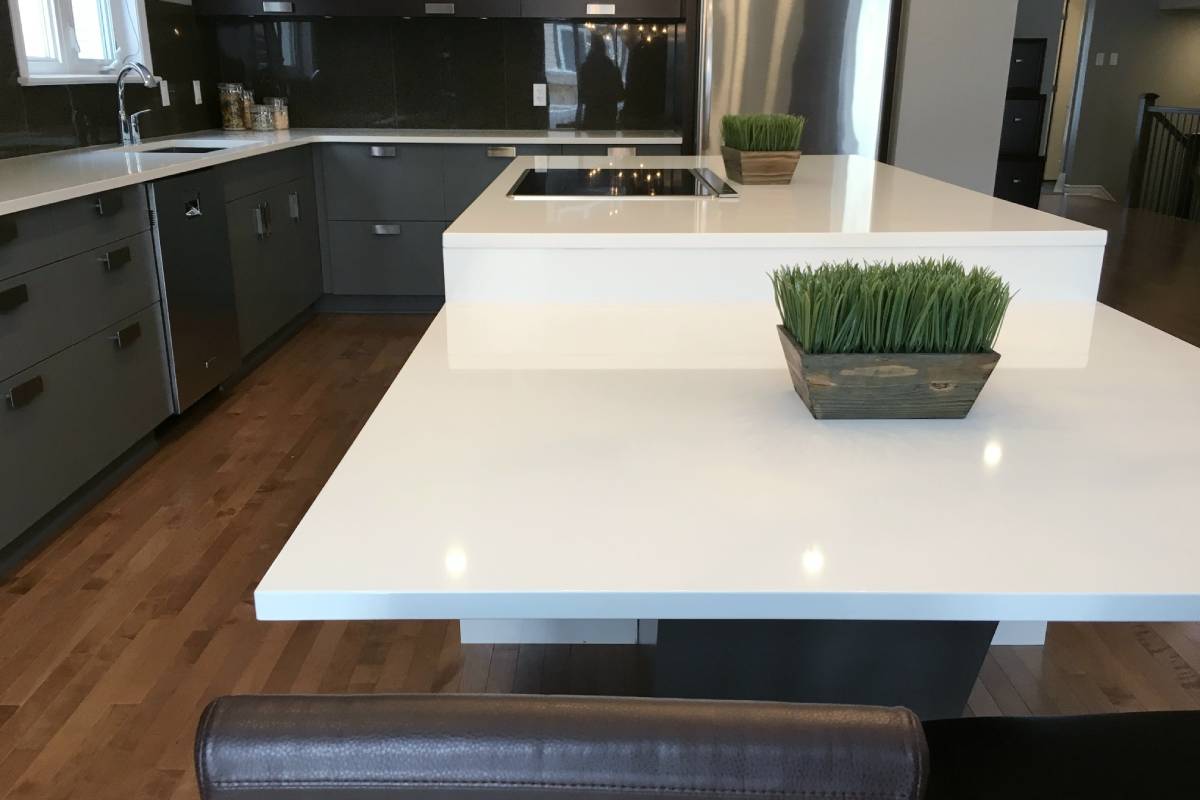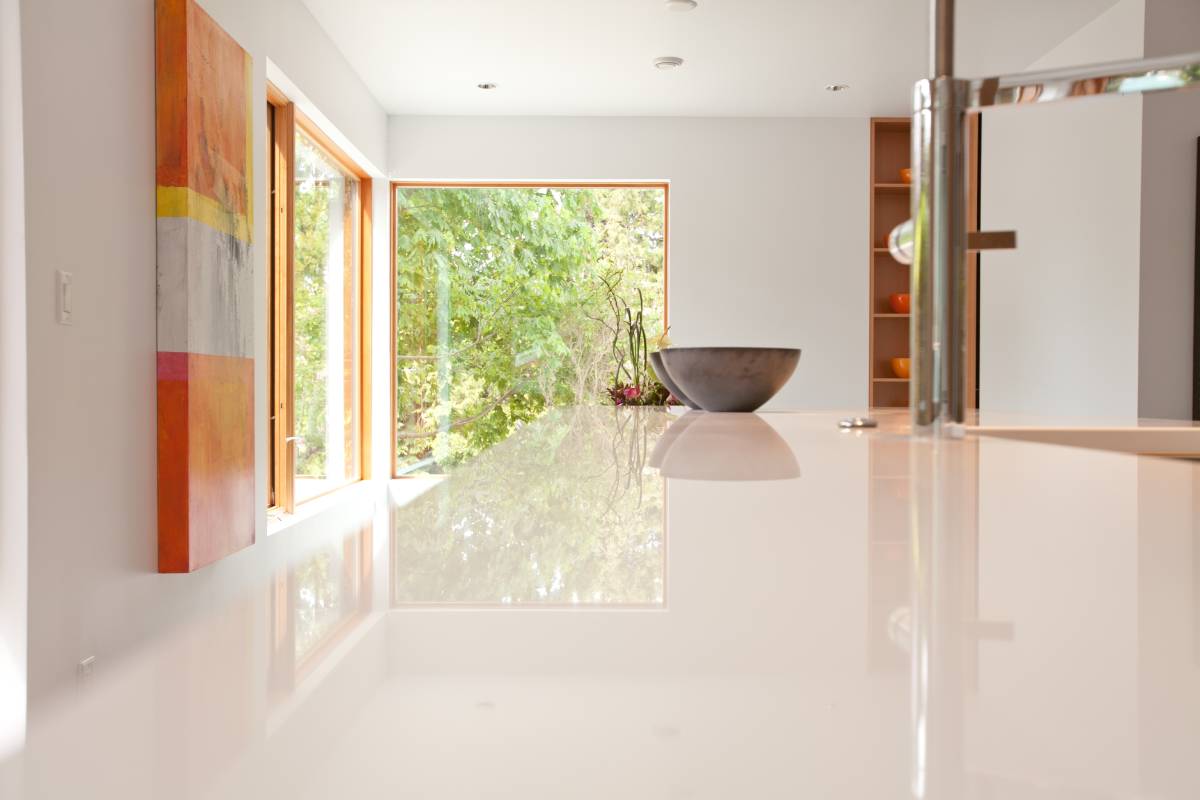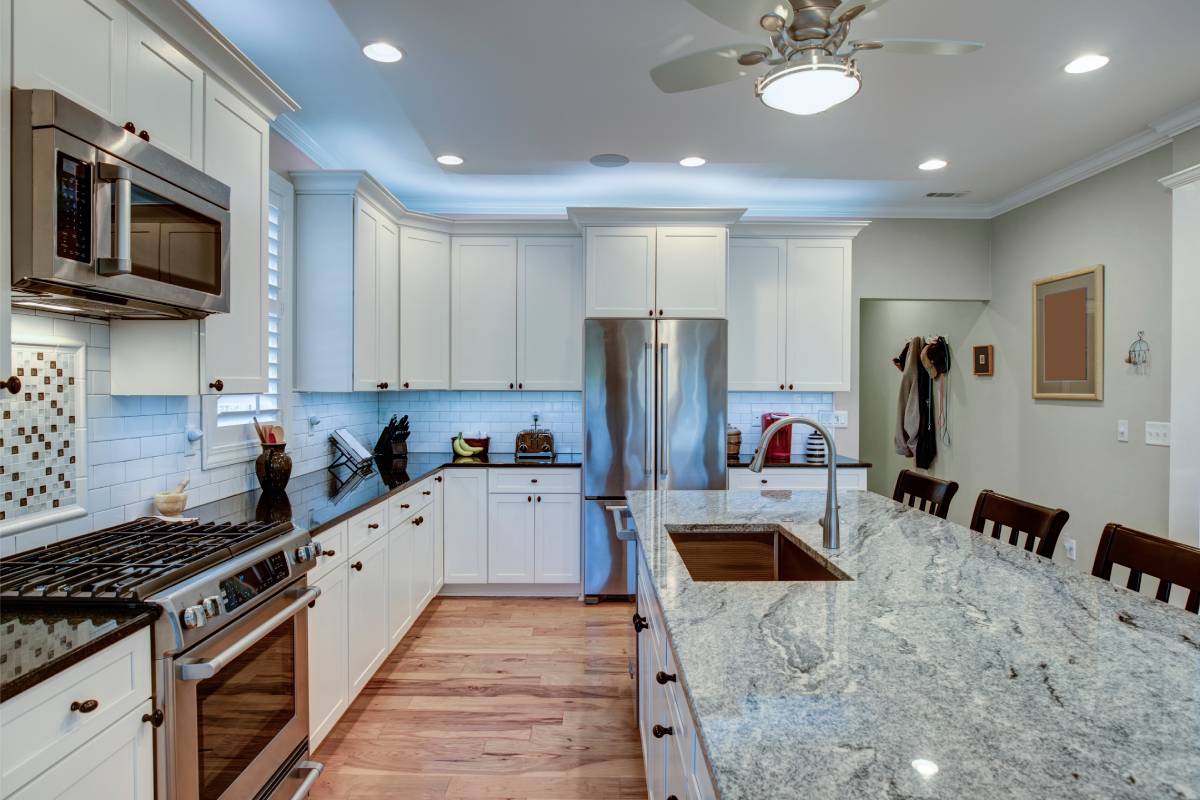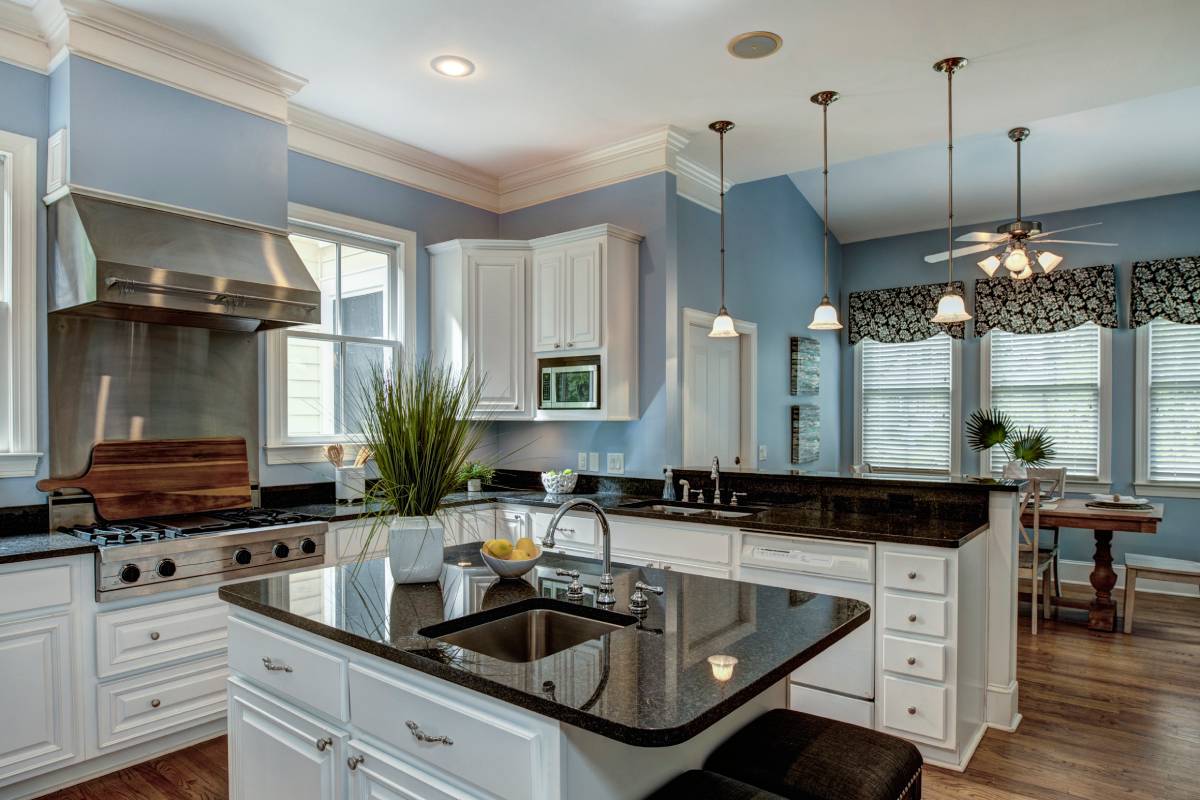Selecting a kitchen countertop is a significant decision due to the considerable investment involved and the fact that you’ll interact with it daily for years. The decision often boils down to choosing between a solid surface countertop or natural granite countertops.
Both solid surface and granite are high-quality materials that offer excellent value and resale potential. However, their differences are substantial. The only commonality is that they may look somewhat similar, especially from a distance.
Related article: How Often Should I Have My Air Conditioner Checked? Can You Clean Your Own Air Conditioner?
What are the differences between Corian and Granite?
Characteristic
Corian Solid Surface
- Corian is a brand by Dupont, representing its flagship solid surface countertop material.
- Solid surface materials, including other brands like Swanstone and Formica, are fully synthetic, made by combining acrylic, epoxide, and polyester resins with pigments and a filler from natural bauxite.
- The specific blend of resins and pigments distinguishes various brands. Higher acrylic resin content is generally considered superior.
- Corian can be moulded into various shapes, but it’s commonly sold as sheets or slabs for countertop fabrication. Some styles have a speckled appearance similar to natural granite.
- One advantage is that pieces can be seamlessly glued together, creating the illusion of a continuous, unseamed countertop.
Granite
- Pure granite countertops are crafted from natural igneous stone, cut from quarried granite blocks.
- The polished slabs come in diverse colours and styles depending on the quarry, ranging from black to white, with various tones of pink, green, yellow, brown, and blue.
- Granite is renowned for its random graining patterns, ensuring each countertop is unique. It’s considered a luxury choice and is among the most expensive countertop options.
- Granite should not be confused with other stone-based materials like quartz (engineered stone). Slab granite is solid stone without additional materials, while engineered stone often has brand names like Cambria, Silestone, and Caesarstone.

Appearance
Corian Solid Surface
Corian and similar solid surface materials are designed to have a subtle speckling reminiscent of some natural stone. However, this effect is usually less pronounced compared to the bold veining and colour variations seen in natural granite.
This smoother, more consistent appearance can be advantageous when you don’t want the countertops to steal the spotlight, especially when you want beautiful cabinetry to be the focal point in a kitchen.
Solid surface materials come in various tones. Corian, for instance, offers over 40 styles, ranging from light white to deep black, with shades of yellow, brown, red, pink, and green. While some types have solid colours, newer options include patterns mimicking granite and marble, though more dramatically.
For certain consumers, the uniformity in pattern and colour of solid surface countertops is a plus. However, others may find that these materials give off a more manufactured or artificial look.
Granite Countertops
Granite countertops are often striking, featuring colour and pattern blends that are entirely unique to each slab. Unlike solid surface materials, every granite slab boasts a distinct appearance.
These countertops stand out as design elements, capturing attention with a diverse range of colours—from the lightest whites to the darkest blacks. Premium prices can even get you bright blue, yellow, and red granites.
Some homeowners prefer the unmistakable look of natural granite, appreciating its colour variations and deep lustre. However, the dramatic nature of granite countertops may not suit everyone. The mottled and bold colouring can be too busy for certain decorating styles. Moreover, all that colour can effectively camouflage crumbs and smudges on the countertop surface, making it appear clean even when it’s not.
Best for Appearance: Granite
When it comes to looks, it’s mainly a personal preference, but for most, the natural beauty of granite tends to be favoured over the consistent appearance of solid surface material.
Water and Heat Resistance
Corian Solid Surface
Corian and similar materials excel in resisting moisture. However, it can be scorched by hot pans, necessitating the use of hot pads, trivets, or cutting boards to shield it from extreme heat.
Granite
Granite, despite its hardness, is surprisingly porous and needs initial sealing, along with periodic reapplications, to prevent moisture and stains. In terms of heat resistance, granite generally outperforms solid surface material. While you can usually place a hot pan on it without worry, extremely hot skillets have been known to crack granite countertops.
Best for Water and Heat Resistance: Tie
Solid surface material is superior in water resistance, while granite takes the lead in heat tolerance.

Care and Cleaning
Both materials are nonporous, ensuring hygienic surfaces that are easy to clean, unlike tiled grout lines.
Corian Solid Surface
Cleaning Corian is straightforward with soapy water or an ammonia-based detergent solution. Avoid glass cleaners, as they can leave a waxy residue. To prevent water spots, thoroughly dry the countertop. Solid surface countertops don’t require sealers, but avoid placing hot pans directly on them, and promptly wipe up staining agents.
Granite
A simple soapy water solution is ideal for cleaning granite. Steer clear of vinegar, window cleaners, or other acidic solutions that could etch the surface over time. Most stains on granite can be removed with a baking soda paste, but regular sealing is recommended.
Best for Care and Cleaning: Solid-Surface Material
Corian and similar countertops are generally easier to clean than granite due to the broader range of cleaning products that can be safely used.
Durability and Maintenance
Corian Solid Surface
Solid surface materials like Corian are prone to scratches, but minor blemishes can be easily buffed out with an abrasive pad. While softer than granite, they are less susceptible to cracking and aren’t vulnerable to etching from acidic substances. Stains are possible but usually manageable.
Granite
Granite is resistant to scratches from knives but can crack relatively easily due to its brittleness. It’s prone to etching from acidic substances like lemon juice and vinegar. Regular sealing helps minimise staining risks.
Best for Durability and Maintenance: Solid Surface Material
While both materials are durable, solid surface material earns the top spot because it doesn’t react to acidic substances and doesn’t require regular sealing.
Installation
Both granite and solid surface countertops are typically professionally fabricated and installed.
Corian Solid Surface
Corian is a forgiving material that can be easily cut with ordinary woodworking tools. Some DIY enthusiasts have even constructed their own countertops, though sourcing the material can be challenging. Unlike laminate sheets readily available at home centres, solid surface materials are usually found in speciality building supply outlets catering to professionals.
Creating Corian countertops involves cutting slabs to size, forming built-up edges, and joining seams with special solvent glues, creating nearly invisible joints. The surface is then sanded, and polished smooth, and cutouts for sinks and fixtures are made, often using a woodworking router.
Granite
Granite countertops are heavy and challenging to cut, so this task is typically left to a professional fabricator. They take precise measurements, shape the countertop slabs, and return to install them. Seams may be somewhat concealed, but sharp eyes can still detect joints between slabs.
Best for Installation: Solid Surface Material
Although both countertop types are usually handled by professionals, working with solid surface material is notably easier than dealing with granite.

Cost
Corian Solid Surface
Solid surface countertops average around $60 per square foot, installed. However, costs can rise to $120 per square foot for complex fabrication or special colours and patterns. The material itself, purchased in sheet form, starts at $35 per square foot, plus additional expenses for epoxy glue to join seams.
Granite
Granite countertops are typically quoted with combined material and labour costs. This calculation involves adding material costs ($40 to $100 per square foot for the granite slab) and a labour charge of $35 to $85 per hour. Overall, a granite countertop installation usually falls in the range of $70 to $100 per square foot, with unique colours and styles potentially reaching up to $200 per square foot.
Note that this pricing is for slab granite, not granite tile, which is a more affordable option but involves grout lines that many prefer to avoid on kitchen countertops.
Best for Cost: Solid Surface Material
Solid surface countertops are a more budget-friendly option compared to granite countertops.
Lifespan
Corian Solid Surface
Corian and similar solid surface materials typically carry a 10-year warranty, but in reality, they can endure for over 30 years. Factors like scratches, burns, or changing style preferences might prompt countertop replacement.
Granite
Granite countertops rank among the most durable, often lasting up to 50 years or more.
Best for Lifespan: Granite
Granite countertops boast an extended lifespan, surpassing that of solid surface materials, which are also resilient.
Resale Value
Corian Solid Surface
Once considered a premium choice, solid surface material has somewhat lost its status with the rise of engineered stone (quartz) countertops. However, it still holds a superior position compared to popular alternatives like laminates and ceramic tiles.
Granite
Granite slab countertops are generally seen as a valuable investment for increasing home sale value. Note that granite tiles or modular granite don’t carry the same prestige as solid slabs, and some engineered stone countertops rival the real estate value of granite.
Why You Might Want Corian
If you seek an affordable yet attractive countertop with minimal maintenance, Corian solid surface is a suitable choice. It provides a heavier, solid feel compared to laminate and tile. Occasional light scratch removal with fine-grit sandpaper or professional assistance may be needed. While future homebuyers generally accept Corian, it may not hold the same prestige as quartz, engineered stone, or granite.
Why You Might Want Granite
Opt for granite if you desire a high-end countertop with distinctive aesthetics, and cost is not a primary concern. Granite, especially in slab form, offers a weightier and more solid feel than Corian. It is also less prone to scratching. If occasional maintenance tasks, like surface sealing, are acceptable, granite is a fitting choice.
While granite remains the top choice for desirable countertop materials, the cost-effectiveness and solid performance of Corian make it a worthy contender.





